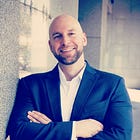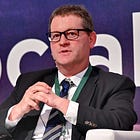Surprise, Surprise! We've entered the Dark Doldrums – and hardly a newspaper isn't covering the topic, especially since Sweden's energy minister, Ebba Busch, has announced she's angry with the Germans, who are to blame for Swedish energy prices have reached unprecedented heights. Her Norwegian counterpart Terje Aasland said, »It’s an absolutely shitty situation,« announcing that Norway intends to cut the electricity lines to Europe when they come up for renewal in 2026. In short: our green, values-based foreign policy, which never tires of emphasizing the supranational, European component of its climate and world rescue project, has led our neighbors to refocus on their national interests. The strange thing about this situation is that no one anticipated it. In this sense, the intellectual dark doldrums preceding the material one is now history – and at the same time, a sense of disquiet that's been a constant companion of our Ex nihilo project from its beginning.
Now, there’s probably no one who doesn't care about a clean environment and doesn't want to contain anthropogenic climate change through an intelligent energy policy. My astonishment began when I realized that today's decision-makers are boldly ignoring all the solutions that history has provided them with – how they've settled into a state that can only be described as Digital Analphabetism.
Considering that the energy transition project amounts to nothing less than constructing an energy internet, the sequence would have been clear: first, a smart grid, parallel with intensive research and development of innovative storage technologies, followed by successive equipping with renewable energy sources. Therefore, excluding nuclear energy should have been ruled out, especially if it'd been made clear that energy technologies are the driving force behind our society—and that it's anything but child's play transferring a social engine that's been patched together for over 120 years to a different system architecture in such short order. That Annalena Baerbock might believe that the internet is a storage network, indeed that this marvel is ultimately driven by goblins (›Raw materials, goblin [Kobold], where do they actually come from?‹), may be attributed to her enthusiasm for international law, that the Minister for Economic Affairs Habeck, before he became Demolition Man, was able to decree:
›The fact is: we currently have a gas problem, not a power problem‹
...casts doubt on the entire government team’s intelligence. After all, the fact that our social system, indeed our entire way of life, depends on the availability of energy should be what Americans call a no-brainer. The connection between mind and energy was a leitmotif I've encountered again and again in my cultural-historical work: from the metallurgical revolution that led to the Alphabet, from the Wheelwork technology of the Middle Ages that gave birth to Capitalism - to the discovery of the vacuum, which feeds not only the steam engine and thermodynamics but also the digital revolution.
Just as little as our contemporaries realize how their solar panels are an epiphenomenon of the transistor and computer chip, so are their actions characterized by a pronounced blindness to the present – and a striking lack of imagination. Translated into an amusing image, the behavior of our decision-makers seems as if we have an aviation hero who, after flying blind for a long time, now proudly destroys his environmentally harmful parachute, jumps out of the plane as he convinces himself he'll be able to improvise a new parachute during his free fall.
When Talleyrand responded to a Napoleonic execution with the phrase:
›It was worse than a crime, it was foolishness,‹
you end up in a register that a historian aptly called ›Stupidology‹ – and that Flaubert, towards the end of his life, was filled with the ambition of writing an encyclopedia of stupidity. You don't have to perform any literary voltes-face; it's enough just talking to knowledgeable contemporaries who skewer the fallacies of our Demolition Men. Here is a brief retrospective from our pages.
It started innocently enough—with a small text written in the winter of 2022:
The conversation with Stuttgart thermodynamicist André Thess posed the question: How was it possible that in the decision to change energy policy, ethicists, theologians, and others were given a voice, but no one had found it necessary to seek out the required expertise? Thess responded with a wonderful Nietzsche quote:
›Insanity is rare in individuals but is the rule in Groups, Political Parties, Peoples, and times.‹
Because the confrontation with experts forces us to sharpen our conceptuality, the question arises as to the origin of those figures of thought so omnipresent and familiar in our day, which, however, when scrutinized, harbor a surprising history. Or, as Wittgenstein said:
›The closer you look at a Word, the further back it looks.‹
Consequently, a text was written exploring the question of where the concept of Sustainability comes from.
A conversation with journalist and political scientist Ralph Schöllhammer, on the other hand, revolved around a more philosophical question: his conviction that every civilization begins with the taming of natural energies.
The discussion with Niko Paech, who has a clear view of the cognitive dissonance of the energy transition and the moral issues of greenwashing, raised the question of whether an energy-related downsizing could be the solution.
If Niko Paech was and is convinced of this, the thoroughly stimulating conversation strengthened my conviction that the management of scarcity is misleading.
No, it's even more troubling that here we're witnessing a return to Malthusian thinking, which not only caused an avoidable famine in Ireland in the 19th century but also actually advocates for a misanthropic form of social Darwinism:
Since we can expect all sorts of surprises when approaching other people's ways of thinking, my first conversation with a climatologist began with an analysis of the Anaversum, the parallel universe inhabited by Donald Duck and his ilk, this duck like you and me. Hans von Storch, as an old social democrat, was stunned by how our political class believes it can prescribe a policy to the world that isn’t only illusory but which no one is willing to follow:
The fact that the government, namely Robert Habeck, stuck to its energy program despite all the adversity was an occasion to take a closer look at the underlying thinking, in particular, the theory of economist Mariana Mazzucato, who had provided Habeck with the intellectual tools for his breakneck interventionism:
How and to what extent the climate issue has become a political issue—no, more than that, a battlefield, became evident in the conversation with Roger Pielke Jr., the Lord Voldemort of climatology, who, as a patient statistician, had questioned particular articles of faith of the activists. This, in turn, resulted in never-ending denunciations and academic ostracism, which ultimately led Pielke to bid farewell to academia:
To better understand how and in what form the issue of climate change affects journalism and published opinion, I had a conversation with Axel Bojanowski, who, as a journalist at Geo, Nature, Der Spiegel, and Die Welt, has been able to observe the changes in the zeitgeist at close quarters. As an explanation for the flagrant madness, he contributed the concept of paedophrasy – which can be read as a form of organized irresponsibility, since here – true to the motto: children's mouths speak the truth – the decision is delegated to the children—which may explain why Greta has become a Latter-day Saint.
A related perspective emerged in the discussion with Robert Zubrin. As a nuclear and space travel specialist, he can reflect on a long NASA career. As the founder of the Mars Society, he accuses the political elite of two failures: one in energy policy and the other in terms of their ability to plan for the future. How can we tackle climate change if we can't even manage to build a Mars station?
The conversation with Fritz Vahrenholt, who had campaigned practically for a clean environment and new forms of energy as Hamburg's Senator for the Environment and later as a manager for large energy companies, was revealing because it made clear, from an insider's perspective, how and why morality had gained the upper hand over intelligent problem-solving strategies in political discourse.
Talking to Scott Tinker broadened the perspective because the University Professor and Texas State Geologist had traveled the world as he examined the Global South's energy poverty, which he immortalized in a series of memorable documentary films
The conversation with Andreas Schulte brought an entirely new perspective into play in that here Dr. Forest, a practitioner of sustainability, talked about what kinds of surprises can be achieved with a relatively long-term view in the Attention Economy of the present, whether it's colliding with investors' quarterly logic or an SPD-led science ministry objecting to the formulation of an institute for the global forestry science elite.
When the circle of these discussions closes - and you end back at the starting point of The Germany Blackout, and to what extent this is due to a spiritual dark doldrums, the conversation with Manfred Haferburg was enlightening. As a young shift supervisor at the GDR's largest nuclear power plant, Haferburg experienced a significant blackout at the turn of 1978/79 – and, after the fall of the Wall, he had advanced to become an advisor to the nuclear industry. Consequently, he's seen more nuclear power plants from the inside than most politicians, which has given him a keen sense of what expertise is built into an energy system.
And so this review ends, which also prompts a great deal of head-shaking – and amazement at how we could have slept through the greatest issues of our time.
Which begs the question of how a collective Don Quixotism has emerged instead.
Perhaps the answer lies in a bon mot bequeathed to us by a comedian of another time:
»Everything has been said, but not yet by everyone.« (Karl Valentin)
Translation: Martin Burckhardt and Hopkin Stanley





















